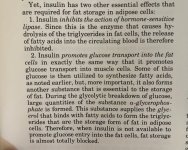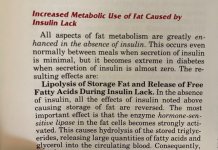One other thing that I have learned in the last 10 years is that glucose metabolism and fat burning are two different things. Metabolism should not be discussed when you're talking about fat burning.
I understand metabolism very broadly to be the sum of anabolism (tissue building) and catabolism (tissue diminishing), such that, at caloric balance (maintenance of body mass diet), the sum is zero, you build the same amount of tissue that you diminish.
The worst way to maintain your body weight is to diminish your muscle tissue, but build up your fat tissue to make up for it, so that your body weight doesn't change, but your body composition got fatter, you just didn't see it happening on the scale.
100% fasting
(iow truly 0 calories of nutrition, meaning only things like water and black coffee or tea are permitted)
is 100% catabolic. It's only tissue dimishing, with no tissue building. It's the fastest way no pun intended, to catabolically shrink your body fat or adipose tissue. The thing is it's a little bit severe, and your body likes to recover from the stress of fasting in something that resembles gluttony, so you have to be careful on the other end, when you break out of the fast. Because once you break your fast and start eating again, if you exceed your maintenance calories just for the day, you're still going to go right back to building up fat tissue, or adipose tissue anabolism. Even though you just came off a fast where you're "eating" a 2000-calorie deficit diet for days on end, you still might be interested in overeating, even though all it's going to do, once it takes care of your body today, it will store all the extra for your body tomorrow. As fat.
So be careful with fasting for fat loss, but if you're going to try it, then consider the findings in this thread, and strength train, so that you don't lose strength. You'll lose muscle mass (catabolic), that's inevitable, but strength loss isn't, because strength is a function of both neorology and muscularity, you're going to lose muscularity on a fast (muscle catabolism), but you can even gain strength neurologically, if you're a beginner or even a new intermediate to weight training, and maybe even more advanced.
Use very high weights
(very low rep range, 1-3 or 1-4; experiment to see which one for you personally; it could also be 1-5 or even 1-10–although 1-10's unlikely–again depending on your own body; bodies vary).
This means you're not going to be doing many reps, and you don't even have to do many sets either. It's not going to take a lot of time. All you have to do is maintain strength. Maintenance training volume, iow.



